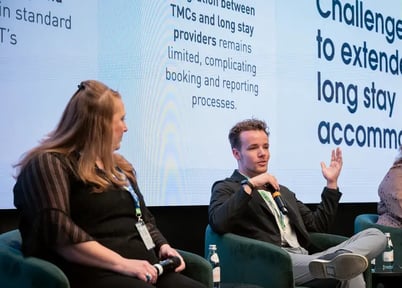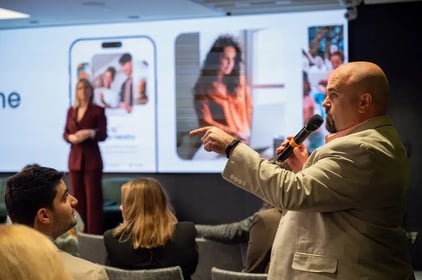Blog / News / Smart, Safe, Sustainable Summit / Global Mobility / Business Travel / AI, Automation & the Human Touch in Global Mobility and Business Travel

News
Smart, Safe, Sustainable Summit
Global Mobility
Business Travel
AI, Automation & the Human Touch in Global Mobility and Business Travel
AI has rapidly moved from an emerging trend to operational reality, forcing organisations to confront new possibilities and new dilemmas. In global mobility and business travel, this tension is particularly pronounced.
With increasingly complex relocations, rising employee expectations, and demand for speed and precision, organisations are actively asking:
Where should we automate?
Where should we maintain the human touch?
And how do we build the optimal hybrid model?
Throughout the past year, we’ve held important conversations with travel and mobility leaders at our Smart, Safe & Sustainable Summits in London and New York, as well as across a series of expert-led webinars. Below, we break down when - and when not - to automate, and share how AltoVita is applying these insights to build the ideal hybrid model that blends AI with the human touch.
When to Automate
So when - and what - should we actually automate?
Across our summit panels, speakers from NBCUniversal, Stripe, Squarepoint Capital, Relocity and The Cozm have highlighted the areas where AI delivers the greatest measurable impact. Key opportunities for automation include:
.jpg?width=428&height=428&name=Beverly%20King%20(1).jpg)
- Eliminating Administrative Burden: From generating meeting summaries and normalising text to auto-processing documentation, triggering backend workflows, and updating property availability, these routine tasks are ideal for automation.
- Freeing Humans for Meaningful Interactions: AI accelerates the “busy work,” enabling people to focus on real connection with clients and guests.
- Speeding Up Critical Processes: In an industry where delays can halt projects, disrupt operations, and cost organisations millions, AI’s ability to accelerate time-sensitive workflows is game-changing. Benjamin Oghene, CEO of The Cozm shared how their platform uses AI to accelerate cross-border compliance filings, reducing the industry standard of 6 weeks to just 60 seconds.
-
Solving Problems Behind the Scenes: Automation is most valuable when it removes behind-the-scenes tasks that don’t meaningfully impact the employee’s experience, allowing teams to focus on solving the real customer problem at hand.
"Anything that doesn't add value to the customer experience becomes an opportunity for automation." - John Morhous, Chief Experience Officer at Flight Centre Travel Group
- Integrating Fragmented Systems: William Taylor, SVP of Partnerships at Relocity, captured a core theme: “AI enhances outcomes. Integration enables them.” He illustrated how a cancelled flight sets off a chain reaction (rebooking, accommodation changes, transport updates) and how AI can intelligently coordinate these complex, interconnected processes through Model Context Protocols (MCP’s).

- Predicting Issues Before They Become Crises: In an unpredictable world shaped by fast-moving geopolitical shifts, agentic AI can be valuable in detecting emerging risks in real time, flagging potential crises and nudging human teams to act long before issues escalate.
"The real promise is in agentic AI and what the agents can do when we're all asleep. They can now flag geopolitical crises and they can make recommendations to the humans to take actions." - William Taylor, SVP of Partnerships at Relocity

7. Meeting Modern User Expectations: Moving between different apps, devices, or platforms adds friction and extra effort, which modern solutions should remove. Today’s travellers expect seamless, one-stop digital experiences where tools, apps, and services integrate effortlessly and eliminate unnecessary complexity.
“For most of my generation (Gen Z), if you’re in school or just got out of school, you’re an expert in AI already and would expect it to be integrated into the tools that you’re using.” - Eric Kline, Global Travel Manager at Simplot
When NOT to Automate
Despite AI’s promise, our speakers agreed on a critical point: not everything should be automated. Here’s where the human touch is especially important in business travel and mobility:

- When Needs Are Deeply Personal: Karen FitzGerald, VP Head of Global Mobility at NBCUniversal, highlighted the critical importance of the relocation experience, emphasizing that certain tasks require a human touch to ensure employees are set up for success. Understanding an assignee’s needs is paramount, and as she noted, that first conversation when someone is relocating to a new country can never be replaced by AI.
- When the Experience Itself Is Human: When designing product solutions, John Morhous emphasised that when a solution directly impacts user experience “that’s where the human touch becomes quite essential.”
- When Emotional Intelligence Matters: While many processes can be automated, there are moments in travel and mobility where emotional intelligence is critical, and human intervention is essential. As William Taylor noted, “AI is not going to drive the sick intern to the hospital”, highlighting the need for managers to step in, provide support, and show empathy when it truly counts.
.jpg?width=435&height=435&name=Emma_Quote%20(1).jpg)
Finding the Balance
Ultimately, success comes from finding the right balance between AI and the human touch. Emma Balogun, Talent Mobility Business Partner at Stripe, captured this perfectly during our London Summit.
How AltoVita Puts the Hybrid Model Into Practice
At AltoVita, we embrace technology to automate and streamline the accommodation booking process. However, our USP lies in our human-centred approach. Our flagship platform - AltoCurate - seamlessly blends technology with a personalised touch.
How we Use AI
So how is AltoVita using AI internally, in its operations and product to deliver value to clients?
Anton Reid, our Director of Engineering, gave a keynote speech at our London Summit to showcase all the different business areas where AI is delivering value both internally and for our clients. From AI powered customisations and predictive pricing to support agents and AI powered analytics, our products are designed to streamline processes and enhance the overall experience.
Here’s a list of AltoVita’s latest AI developments:
- VITA AI: A secure, proactive AI agent that understands natural language, handles booking requests, and provides real-time support.
- System Integrations: Our Outlook Add-in allows clients to submit, review, and approve accommodation requests directly from their inbox, eliminating the need to switch between platforms.
- AltoStay: A mobile-first guest experience app delivering personalised AI-driven recommendations, helping employees settle in quickly and access activities tailored to their interests.
.png?width=836&height=418&name=AltoStay%20(3).png)
Where the Human Touch Lives at AltoVita
Even in an era of advanced AI and automation, the human element remains critical in ensuring personalised care, cultural understanding and meaningful experiences for every employee.
Here’s where our human touch makes all the difference:
- Accompanied site visits and thorough property vetting to ensure every accommodation meets corporate standards and client expectations
- Customer Success teams curating shortlists with expert insight and attention to detail
- Close collaboration with clients to understand company culture and the specific needs of their employees
- High-touch personalised service for VIP travellers and assignees, from grocery baskets to wellbeing check-ins
- Always-on access to real humans via phone, WhatsApp, or chat for support whenever it’s needed
- In-person events that foster meaningful connections, share thought leadership, and provide actionable insights for mobility and travel professionals
Where to Find Us Next
Our next AltoVita Summit will be held in Dubai in April 2026. Pre-registration is now open for travel and mobility leaders shaping the future of the industry.



